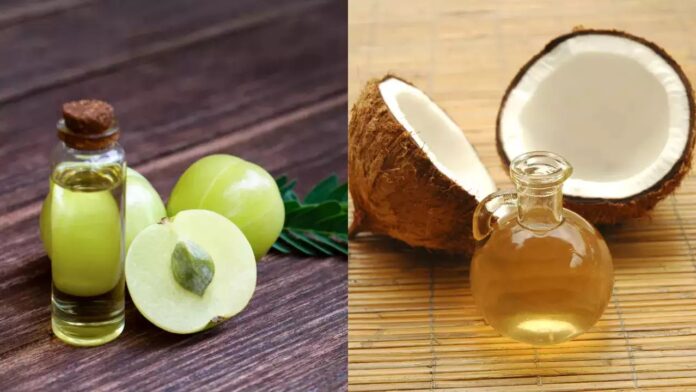Natural oils have been used for hair nourishment since ancient times, with coconut oil and amla oil standing out as two of the most popular choices. Both are deeply rooted in traditional Indian hair care practices and offer unique benefits. Here’s a closer look at the key differences between these two oils.
Coconut Oil
Coconut oil is extracted from the mature flesh or kernel of coconuts and is rich in lauric acid, a medium-chain fatty acid known for its numerous health benefits. This oil boasts several antibacterial and moisturising properties, making it a popular choice for hair care.
Benefits of Coconut Oil
- Deep Moisturiser: Coconut oil effectively moisturises hair, keeping it manageable and smooth while reducing frizz.
- Protective Barrier: It forms a protective layer around the hair, shielding it from UV rays, heat styling and environmental damage.
- Natural Conditioner: Ideal for dry and damaged hair, coconut oil penetrates the hair shaft to deliver intense moisture.
- Scalp Health: With its antifungal and antibacterial properties, coconut oil helps maintain a healthy and infection-free scalp.
- Dandruff Reduction: Regular use can minimise dandruff and promote a healthy scalp environment, essential for optimal hair growth.
Amla Oil
Amla oil is derived from the fruit of the Indian gooseberry (Phyllanthus emblica), commonly known as amla. Rich in vitamins, antioxidants, and essential fatty acids, this oil is a potent ally for hair growth. It has a long history of use in Ayurvedic medicine for promoting hair health, preventing premature greying and offering various other health benefits.
Benefits of Amla Oil
- Restores Shine: Amla oil helps restore the hair’s natural lustre, imparting a vibrant and healthy appearance.
- Delays Greying: With its high vitamin C content, amla oil preserves natural pigmentation, helping to delay the onset of grey hair.
- Promotes Scalp Health: Its anti-inflammatory properties contribute to a healthy scalp by reducing dandruff and soothing irritation.
- Strengthens Hair Follicles: Amla oil strengthens hair follicles, promoting hair growth while antioxidants work to combat free radicals that can inhibit growth.
- Reduces Split Ends: By fortifying hair strands, amla oil helps minimize split ends and breakage, enhancing overall hair health.
Comparing Coconut Oil With Amla Oil
Suitability of hair types
- Amla Oil: Thanks to its balanced properties, amla oil is suitable for all hair types. It is particularly beneficial for those with oily scalps and hair, helping to maintain a healthy scalp environment.
- Coconut Oil: Ideal for repairing frizzy and damaged hair, coconut oil provides deep conditioning and exceptional moisture retention. It’s especially effective for dry or coarse hair types that require extra hydration and nourishment.
The nutritional profile
- Amla Oil: Packed with antioxidants, phytonutrients, and vitamin C, which support healthy hair.
- Coconut oil: Offers deep moisture and protection thanks to its lauric acid and medium-chain triglycerides.
Texture and scent
- Amla Oil: Some people may find its powerful herbal aroma irritating. It has a somewhat thicker consistency than coconut oil.
- Coconut Oil: Light in texture and easily melted when heated, coconut oil has a nice, tropical aroma.
Use/application
- Amla Oil: You can use this oil as a hair treatment or combine it with other oils to apply it to your scalp and hair. You can then wash it off after a few hours or overnight.
- Coconut Oil: Used as a styling product, leave-in conditioner, and pre-wash treatment. It works best when rubbed into the scalp and hair, left for a few hours or overnight, and then rinsed off.


